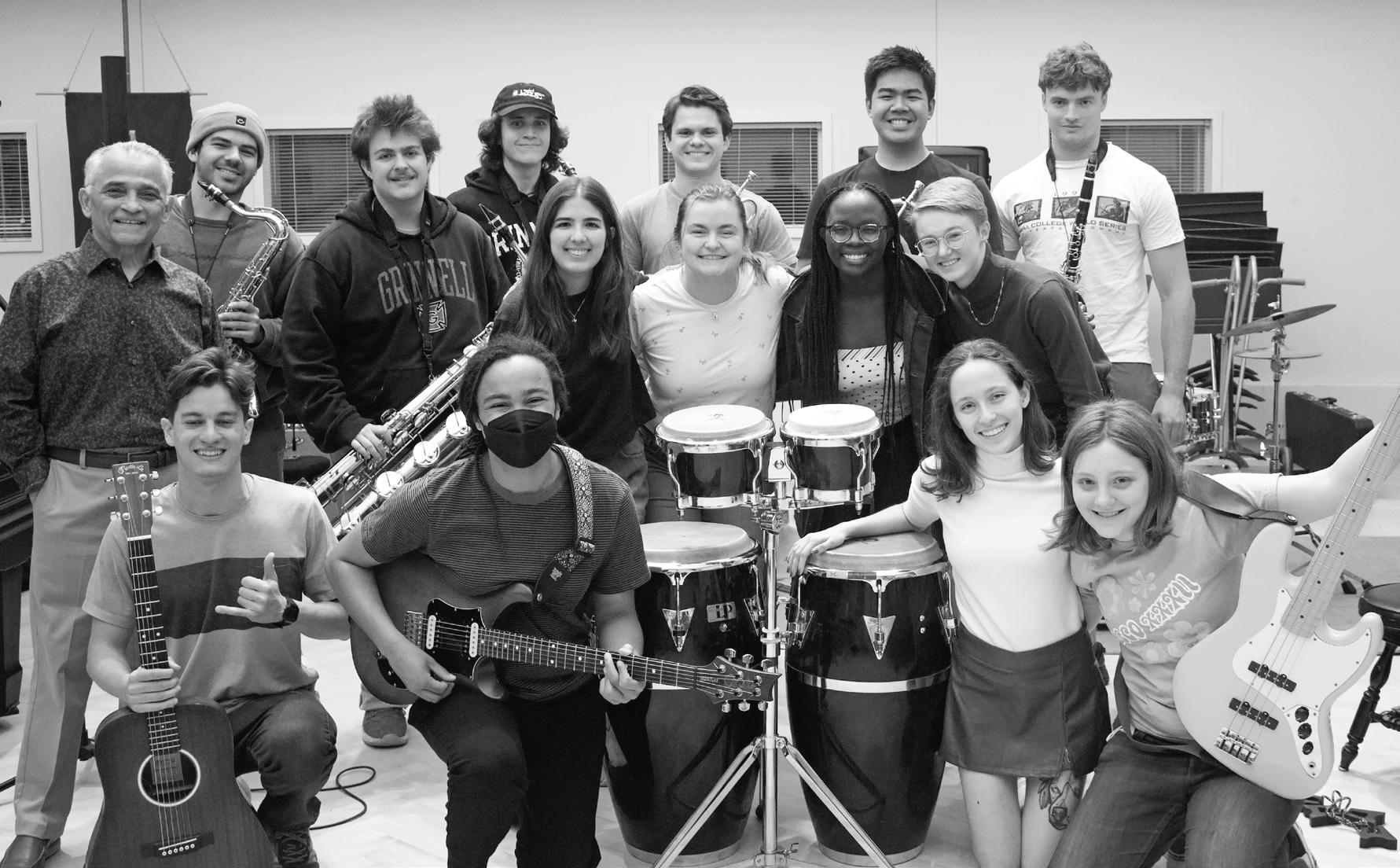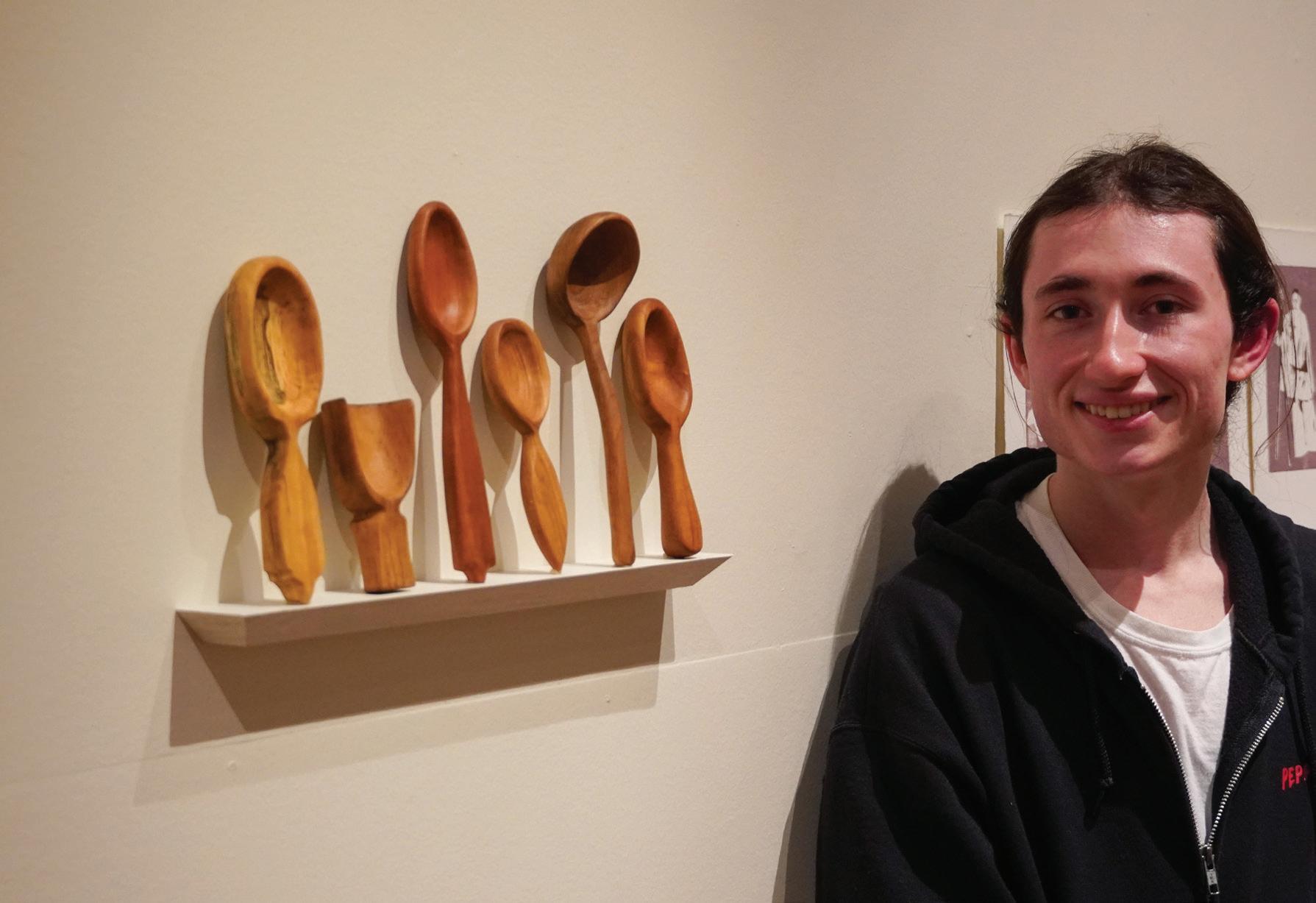
4 minute read
Students Speak: Up in the air about tornadoes
By Nadia Langley langelyn@grinnell.edu
“But how can we connect this to antiracism on campus?” Sophia Unzicker `26 posed this question to the five other students attending the antiracist agriculture reading group on Wednesday afternoon in the Humanities and Social Studies Center. The group comprised several Farm House residents and two other Grinnell College students.
Advertisement
This really was just a start on our end to make sure that we are engaging with this material and recognizing that agriculture and farming is an inherently white-dominated space.
Phillip Tyne `24
Phil Tyne `24 got the idea for an anti-racist reading group after going through the Farm House email account and finding an email from the National Young Farmers Coalition with a racial equity toolkit attached. This toolkit is composed of readings exploring racial equity in farming as well as suggested assignments and discussion questions for facilitating group conversation.
“This really was just a start on our end to make sure that we are engaging with this material and recognizing that agriculture and farming is an inherently white-dominated space,” said Tyne. “For those things to be deconstructed and changed, we have to make sure that we are aware and engaging with those uncomfortable discussions.”
The first two reading groups were held on Feb. 22 and March 8, the dates chosen to best accommodate the other events happening on campus. Tyne and fellow Farm House resident Tristan Davis `25 selected a main reading for each meeting as well as other optional readings related to each day’s main topic. The first meeting aimed to introduce participants to antiracism and agriculture, the second focused on engaging with theory around the topics. The third reading group was held on April 19 and aimed at tackling the question — What’s next?
“Whenever, as Grinellians, we engage in these really hard topics, oftentimes it comes away feeling like, ‘well, now what are we going to do?’” said Tyne.
The reading selected for the April 19 meeting was “4 Not-So Easy Ways to Dismantle Racism in the Food System,” by Leah Penniman. Conversation shifted from initial responses to the reading to a broader discussion on the use of pesticides on campus, where food in the Dining Hall is sourced and how these issues affect different groups on campus in distinct ways.
Participants listed multiple student and community organizations as potential collaborators throughout the discussion, including the Student Environmental Committee which is affiliated with the office of sustainability at the College, the Center for Prairie Studies and Imagine Grinnell, a partner program of the Claude W. and Dolly Ahrens Foundation.
“There’s so much stuff going on, but we’re kind of disconnected,” said Unzicker in reaction to the many sustainability-oriented organizations on campus and in the town of Grinnell.

“Is there a way to collate all the environmental activity happening at the College and in the community?” asked Hemlock Stanier `25, who also lives in Farm House. Participants considered creating a newsletter or social media page to facilitate communication between these organizations. The group settled on compiling a list of organizations to connect with and encourage attendance at the Eco Campus regular meetings open to all students, faculty and staff.
Is there a way to collate all the environmental activity happening at the College and in the community?
Hemlock Stanier `25
Tyne and the other organizers said they hope to continue the reading group and related programming next year, and that using Farm House as a meeting space open to all students interested in farming and antiracist work is a priority.

By Oliver Palmer palmerol@grinnell.edu
Attending Grinnell College offers students from around the world the opportunity to experience something distinct — tornadoes and
William Donaldson `23
William Donaldson `23 is from Silver Spring, Maryland. The first time he heard a tornado siren was at Grinnell. Despite living in the Northeastern United States, Donaldson has some knowledge of tornadoes. Donaldson wanted to be a meteorologist when he was younger, which led to an interest in the TV show “Storm Chasers.” It was from “Storm Chasers” that Donaldson picked up on cues for when a tornado spawning was likely.

“The Grinnell experience with tornadoes has been hilarious because now all my friends know about that, and they always consult me when we have the watches and warnings,” Donaldson said. “I like to consider myself an amateur storm watcher.”
Donaldson said that he does not always take shelter when he hears the tornado sirens.
“Sometimes I know that it [tornado siren] is sounding for a tornado that's to our east, and the storm is tornado sirens. When tornado sirens go off, students react to them in a variety of ways, as many have never seen a tornado before. Some students choose to seek shelter immediately, while others more used to the sirens brush off the warnings. moving east so it's never gonna hit us,” Donaldson said. “But I definitely think it's the best practice to default to sheltering.”
Ty Jones `26
Ty Jones `26 is from The Bronx, New York. The first time Jones heard a tornado siren go off was also at Grinnell.
“I didn’t know they [tornado sirens] existed originally,” Jones said. “I thought it was the purge, to be honest. It terrified me. I was like, ‘what is that?’”
While Jones went to the basement, a few of his friends went outside to see the incoming storm, but he didn’t join them.
“I know my mom would have beat me if I did that,” Jones said.
CONTRIBUTED BY TY JONES
Shloke Maresh `23
Shloke Meresh `23 is from New Delhi, India. Meresh explained that while there have been a few rare tornadoes in Delhi, none have occurred in his lifetime. In his four years at Grinnell, Meresh estimates that he has heard the tornado sirens go off twice.

“The first time, I'd say I was a little more scared because it was the first time I was experiencing anything like that,” Meresh said.
Despite it being Meresh’s first encounter with a potential tornado, he chose not to take shelter because it occurred during finals week.
“I just kind of stayed in my room with my work, but I was really cautious, and I kept checking my phone and if anyone texted me saying it was getting really bad I would've gone down and taken shelter,” Meresh said.

Meresh explained that his second experience with tornado sirens occurred when he was hosting a computer science tutoring session in Noyce.
“Honestly, it was again probably
CONTRIBUTED BY SHLOKE MARESH a little careless of me, but I wasn't too alarmed,” Meresh said. “At the beginning when the alarm went off, I went down [to the basement] for, like, a couple minutes, but then I was back upstairs and tutoring kids for CS.” While Meresh does not always take shelter when tornado sirens go off, he does make sure to stay indoors.










